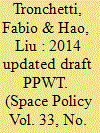|
|
|
Sort Order |
|
|
|
Items / Page
|
|
|
|
|
|
|
| Srl | Item |
| 1 |
ID:
142582


|
|
|
|
|
| Summary/Abstract |
On June 10, 2014, Russia and China presented the updated Draft Treaty on the Prevention of the Placement of Weapons in Space, the Threat or Use of Force Against Space Objects (PPWT) to the Conference on Disarmament. The original 2008 Draft PPWT had been poorly received and criticized, inter alia, for not addressing the most pressing threats to space objects, strategically favoring the interests of its co-sponsors and lacking reliable means of verification.
In presenting the 2014 update the Russian and Chinese representatives pointed out that it had been drafted by taking into account the criticism leveled to its 2008 version and that it should be now viewed as an international effort rather than as a mere Chinese and Russian initiative: they also added that for this reason the amended Draft PPWT constituted a solid instrument to enhance the security of space objects and stood a higher chance of success than its predecessor.
It is, thus worth wondering whether the positive attitude and high expectations of China and Russia towards the amended Draft should be shared or rejected (counteracted, opposed). The present paper gives a rather negative answer to this question. While proceeding to a substantial re-wording and re-organization of its text, the amended Draft maintains the most controversial and debatable aspects of its 2008 version. Therefore, it seems unlikely that delegations within the CD might support it.
Despite its overall negative assessment, the present paper argues that the submission of 2014 updated Draft PPWT may positively contribute, at least indirectly, to the security of space objects. The likely failure of the amended draft could be used by the CD members as an opportunity to focus their efforts in putting in place legal barriers to selected threats to space objects, such as the testing of destructive, debris-generating, ASAT devices. There are elements to believe that a ban on destructive ASAT tests could be achieved and acceptable by the majority of States.
|
|
|
|
|
|
|
|
|
|
|
|
|
|
|
|
| 2 |
ID:
106909


|
|
|
|
|
| Publication |
2011.
|
| Summary/Abstract |
Preventing the weaponization of outer space is one of the most relevant issues of the current space law debate. In recent years discussions on this issue have significantly increased in international fora, such as the UN Conference on Disarmament and the COPUOS. While it has not been possible to arrive at an agreed solution on how to efficiently deal with the problem of possible weaponization of outer space so far, several valuable proposals have been put forward. China and Russia, on the one side, and the European Union, on the other, have taken the lead in this respect. While the former have submitted a proposal for a draft treaty on the demilitarization of outer space, known as the PPWT, the latter has issued a Draft Code of Conduct for Outer Space Activities. Despite the differences between the two proposals, this paper proposes the development of a Chinese, Russian and European common approach aimed at preventing the weaponization of outer space. Although such a goal is undoubtedly challenging, some political and legal factors may enable such cooperation in the not-too-distant future.
|
|
|
|
|
|
|
|
|
|
|
|
|
|
|
|
|
|
|
|
|